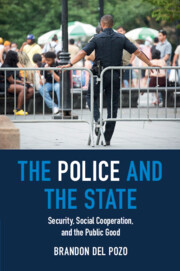Book contents
- The Police and the State
- The Police and the State
- Copyright page
- Contents
- Introduction
- Chapter 1 The Role of the Police
- Chapter 2 The First Power of the Police
- Chapter 3 The Second Power of the Police
- Chapter 4 The Third Power of the Police
- Chapter 5 Democratic Priorities, Relationships, and Tensions
- Chapter 6 The Bases of, and Reasons for Seeking, Police Legitimacy
- Chapter 7 Procedural Justice in Policing Revisited
- Chapter 8 Policing with Public Reason
- Chapter 9 Policing Populism, Protecting Pluralism
- Chapter 10 Primary Goods, Policing States in Transition, and Natural Experiments
- References
- Index
Chapter 2 - The First Power of the Police
Impartial Protection and Rescue
Published online by Cambridge University Press: 17 January 2023
- The Police and the State
- The Police and the State
- Copyright page
- Contents
- Introduction
- Chapter 1 The Role of the Police
- Chapter 2 The First Power of the Police
- Chapter 3 The Second Power of the Police
- Chapter 4 The Third Power of the Police
- Chapter 5 Democratic Priorities, Relationships, and Tensions
- Chapter 6 The Bases of, and Reasons for Seeking, Police Legitimacy
- Chapter 7 Procedural Justice in Policing Revisited
- Chapter 8 Policing with Public Reason
- Chapter 9 Policing Populism, Protecting Pluralism
- Chapter 10 Primary Goods, Policing States in Transition, and Natural Experiments
- References
- Index
Summary
The first power of the police is their ability to use force to protect and rescue third parties. This understanding departs in a critical way from the Weberian argument that the government has a monopoly on the use of force by observing that a police officer’s ability to use force to defend others is available to all people. It is not only provided for under laws that allow all people to defend others but also as a moral prerogative that exists prior to and outside of political arrangements, democratic or otherwise. The police are distinguished from their fellow citizens by embodying a role that discharges protection and rescue as a duty, rather than a prerogative. The discharge of this duty by what Nozick would call a “dominant protective association” is a necessary requirement to demarcate the state from nature, suggesting that the police role is integral to the definition of the state and a requirement of its initial formulation. From this duty follows the role responsibility to use this force as minimally and economically as possible, and as a backstop, the police role further sanctifies life by creating the citizen’s duty to retreat from interpersonal threats when they can safely do so.
Keywords
- Type
- Chapter
- Information
- The Police and the StateSecurity, Social Cooperation, and the Public Good, pp. 26 - 46Publisher: Cambridge University PressPrint publication year: 2022



